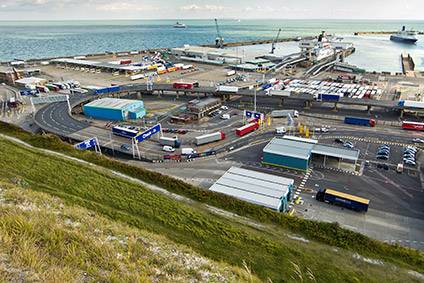
The UK food industry has warned shipments in certain foods will be “unviable in the short term” should what the country’s government describes as “reasonable worst-case scenario” planning for post-Brexit disruption come to pass.
In a report published today (23 September), the UK government set out its worst-case assumptions for the impact of freight between the country and the EU in the event of no trade deal being struck between the two markets.

Discover B2B Marketing That Performs
Combine business intelligence and editorial excellence to reach engaged professionals across 36 leading media platforms.
The UK government claimed it was the “planning assumption” the EU will impose third-country controls on UK goods at the end of the transition period, which elapses on 31 December.
If so, the UK government said all freight travelling to the border without the correct documentation will be stopped before boarding services in the country or on arrival in the EU.
The report’s “reasonable worst-case scenario” is that 40-70% of trucks travelling to the EU might not be ready for new border controls.
London claimed a lack of capacity to hold unready trucks at French ports, or to turn away freight prior to boarding in the UK, could reduce freight to 60-80% of normal levels “at the bottom end of the readiness range”. The UK government said that would mean queues of up to around 7,000 port-bound trucks in Kent in south-east England and “maximum delays of up to two days”.

US Tariffs are shifting - will you react or anticipate?
Don’t let policy changes catch you off guard. Stay proactive with real-time data and expert analysis.
By GlobalDataThe report said: “Heavy goods vehicles that are caught up in congestion in the UK will be unable to travel to the EU to export products and/or collect another consignment, therefore we assume both imports and exports could be disrupted to a similar extent.”
Addressing the House of Commons today (23 September), UK cabinet minister Michael Gove, who is leading the country’s preparations for the end of the transition period with the EU, said: “It is clearly far better that everyone is aware now of what is needed to prepare rather than to face additional disruption next year.”
The Food and Drink Federation representing the country’s manufacturers issued a critical response, led by its chief executive Ian Wright.
“Industry needs no reminder that time is desperately short. Businesses are crying out for answers and we have said this over and over to ministers,” Wright said.
“Initial delays of two days at the ports will mean trade in short shelf life goods such as fruit, vegetables and products of animal origin will not be viable in the short term. Essential ingredients and finished consumer products will not arrive fit for human consumption.”
Gove stressed the UK government is trying to help businesses by imposing new border controls on imports in stages, with the final implementation of controls not expected until July next year.
An updated version of the UK’s Border Operating Model guide, containing “more granular detail”, will be published in the “coming weeks”.
The FDF’s Wright responded: “Government’s assumptions only account for phase one of the UK’s phased border model, which runs to the end of March 2021. Phases two and three will create significant additional disruption with imports of animal and plant products requiring health certification and checks as the full border operating model is rolled out.
“The absence of clarity in certain areas, including product labelling, means it is too late for a lot of businesses to be fully ready for 1 January 2021. We are urging the UK Government to provide targeted periods of adjustment, and even amnesty, to minimise the impacts on manufacturers and UK shoppers.”
Gove warned of missed economic opportunities for UK companies that are ill-prepared for when the country leaves the EU single market and customs union at the end of the transition period in December, and they also risk “much wider disruption”.
He noted how survey evidence indicates that while 78% of businesses have taken steps for the UK’s departure from the grips of the European Union, just 24% believe they are fully ready.
Gove added the UK government is “committed to negotiating a new free trade agreement” with the EU before the end of the transition period.
“Whether we secure a good FTA before January or not, whether we get a Canada-style deal or exit on Australian terms, we will have left the Single Market and the Customs Union,” Gove said. “That fact means adjustments for businesses trading with the EU, changes for citizens travelling to the EU and of course new responsibilities for Government in both scenarios.
“Businesses which are fully ready for life outside the Customs Union will also of course be better prepared for the growing number of export opportunities outside Europe as the UK establishes new trade relationships with partners across the globe.”
Nevertheless, the FDF suggested the Government has not moved enough to address concerns among its members.
“The FDF has presented government with many questions on practical issues that are key to business preparations, with many of these first raised more than a year ago,” Wright said. “These include fundamental questions about what simple commodities can be exported or face restrictions from 1 January 2021.”





